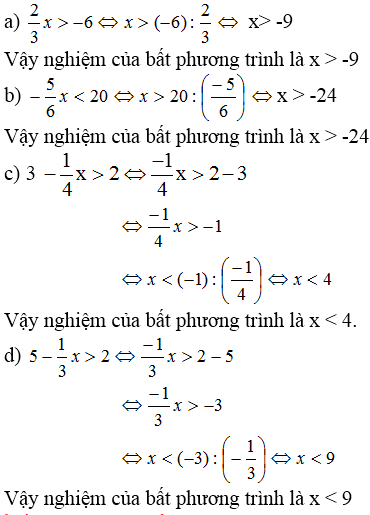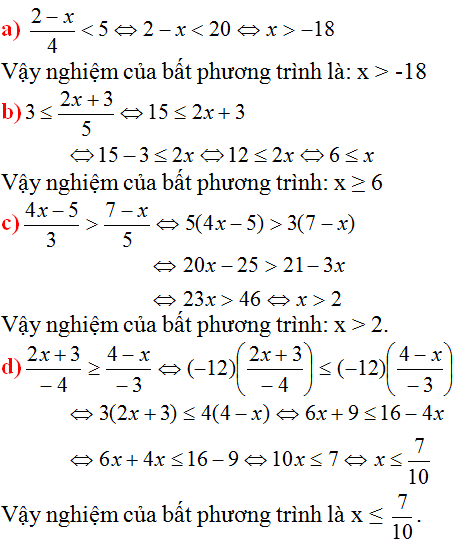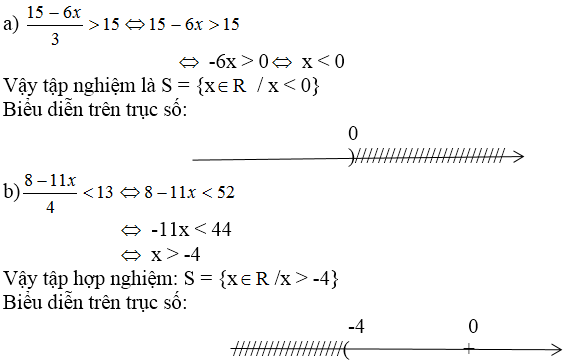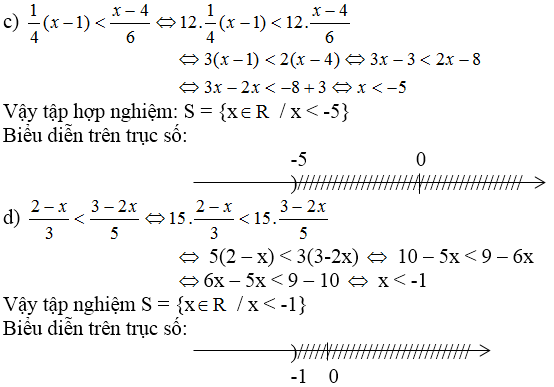Hãy nhập câu hỏi của bạn vào đây, nếu là tài khoản VIP, bạn sẽ được ưu tiên trả lời.

a: \(x>3:\dfrac{1}{2}=6\)
b: \(x>-2:\left(-\dfrac{1}{3}\right)=6\)
c: \(x>-4:\dfrac{2}{3}=-6\)
d: \(x< -6:\dfrac{3}{5}=-10\)

a) -2x > 23 ⇔ x > 23 + 2 ⇔ x > 25.
Vậy nghiệm của bất phương trình là x > 25
Nhận xét: Sai lầm là: khi tìm x phải nhân hai vế với \(-\dfrac{1}{2}\) hoặc chia hai vế cho -2 và đổi chiều bất phương trình
Lời giải đúng: -2x > 23
⇔x < 23 : (-2)
⇔x < -11,5
Vậy nghiệm của bất phương trình: x < -11,5
b) \(-\dfrac{3}{7}x>12\Leftrightarrow\left(-\dfrac{7}{3}\right).\left(-\dfrac{3}{7}\right)>\left(-\dfrac{7}{3}\right).12\Leftrightarrow x>-28\)
Vậy nghiệm của bất phương trình là x > -28.
Nhận xét: Sai làm là nhân hai vế của bất phương trình cho mà không đổi chiều bất phương trình.
Lời giải đúng:
\(-\dfrac{3}{7}x>12\Leftrightarrow\left(-\dfrac{7}{3}\right).\left(-\dfrac{3}{7}x\right)< \left(-\dfrac{7}{3}\right).12\)
⇔ x < -28
Vậy nghiệm của bất phương trình là x < -28.

a: \(x< -9:\dfrac{3}{2}=-9\cdot\dfrac{2}{3}=-6\)
b: 2/3x>-2
hay x>-2:2/3=-3
c: \(2x>\dfrac{9}{5}-\dfrac{4}{5}=1\)
hay x>1/2
d: \(\Leftrightarrow x\cdot\dfrac{3}{5}>6-4=2\)
hay x>2:3/5=2x5/3=10/3

a) \(\dfrac{1-2x}{4}-2< \dfrac{1-5x}{8}\\ < =>\dfrac{2-4x}{8}-\dfrac{16}{8}< \dfrac{1-5x}{8}\\ < =>2-4x-16< 1-5x\\ < =>-4x+5x< 1-2+16\\ < =>x< 15\)
Vậy : tập nghiệm của bất phương trình là S= \(\left\{x|x< 15\right\}\)
b) \(\dfrac{x-1}{4}-1>\dfrac{x+1}{3}+8\\ < =>\dfrac{3x-3}{12}-\dfrac{12}{12}>\dfrac{4x+4}{12}+\dfrac{96}{12}\\ < =>3x-3-12>4x+4+96\\ < =>3x-4x>4+96+3+12\\ < =>-x>115\\ =>x< -115\)
Vậy: tập nghiệm của bất phương trình là S=\(\left\{x|x< -115\right\}\)

2x+4<a2 -ax
2x-ax<a2 -4
(2-a)x<(a--2)(a+2)
-(2-a)x >(2-a)(2+a)
-x>2+a
=> x<-(2+a)
\(\Leftrightarrow2x+4+ax-a^2<0\)
\(\Leftrightarrow\left(2+a\right)x<\left(a-2\right)\left(a+2\right)\)
nếu a=-2=> vô nghiệm
nếu a<-2=>x>(a-2)
nếu a>-2=> x<(a-2)

\(\frac{ax-b}{a}+(a+b+1)x>\frac{2b}{a}\)
<=> \(x-\frac{b}{a}+\left(a+b+1\right)x>\frac{2b}{a}\)
<=> \(\left(a+b+2\right)x>\frac{3b}{a}\)
Giờ biện luận theo a và b thôi

\(\frac{x}{x-2}+\frac{x+2}{x}>2\)
\(\Leftrightarrow\frac{x^2+\left(x-2\right)\left(x+2\right)}{x\left(x-2\right)}>2\)
\(\Leftrightarrow\frac{x^2+x^2-4}{x^2-2x}>2\)
\(\Leftrightarrow2x^2-4>2x^2-4x\)
\(\Leftrightarrow-4>-4x\)
\(\Rightarrow x>1\)
Vậy ..............
\(\Rightarrow\frac{x\times x}{\left(x-2\right)x}+\frac{\left(x+2\right)\left(x-2\right)}{x\cdot\left(x-2\right)}>\frac{2\cdot x\cdot\left(x-2\right)}{x\cdot\left(x-2\right)}\)
\(\Leftrightarrow x^2+x^2-2^2>2x^2-4x\)
\(\Leftrightarrow x^2+x^2-2x^2+4x>4\)
\(\Leftrightarrow4x>4\)
\(\Leftrightarrow x>1\)
\(\Rightarrow\)nghiệm của bất phương trình là 1




\(\Leftrightarrow\dfrac{x}{a}-x>4-a-\dfrac{3}{a}\)
\(\Leftrightarrow x\left(\dfrac{1}{a}-1\right)>\dfrac{4a-a^2-3}{a}\)
- Nếu \(\dfrac{1}{a}-1>0\Leftrightarrow0< a< 1\)
\(\Rightarrow x>\dfrac{4a-a^2-3}{a\left(\dfrac{1}{a}-1\right)}\Leftrightarrow x>a-3\)
- Nếu \(\dfrac{1}{a}-1< 0\Leftrightarrow\left[{}\begin{matrix}a< 0\\a>1\end{matrix}\right.\)
\(\Rightarrow x< \dfrac{4a-a^2-3}{a\left(\dfrac{1}{a}-a\right)}\Leftrightarrow x< a-3\)